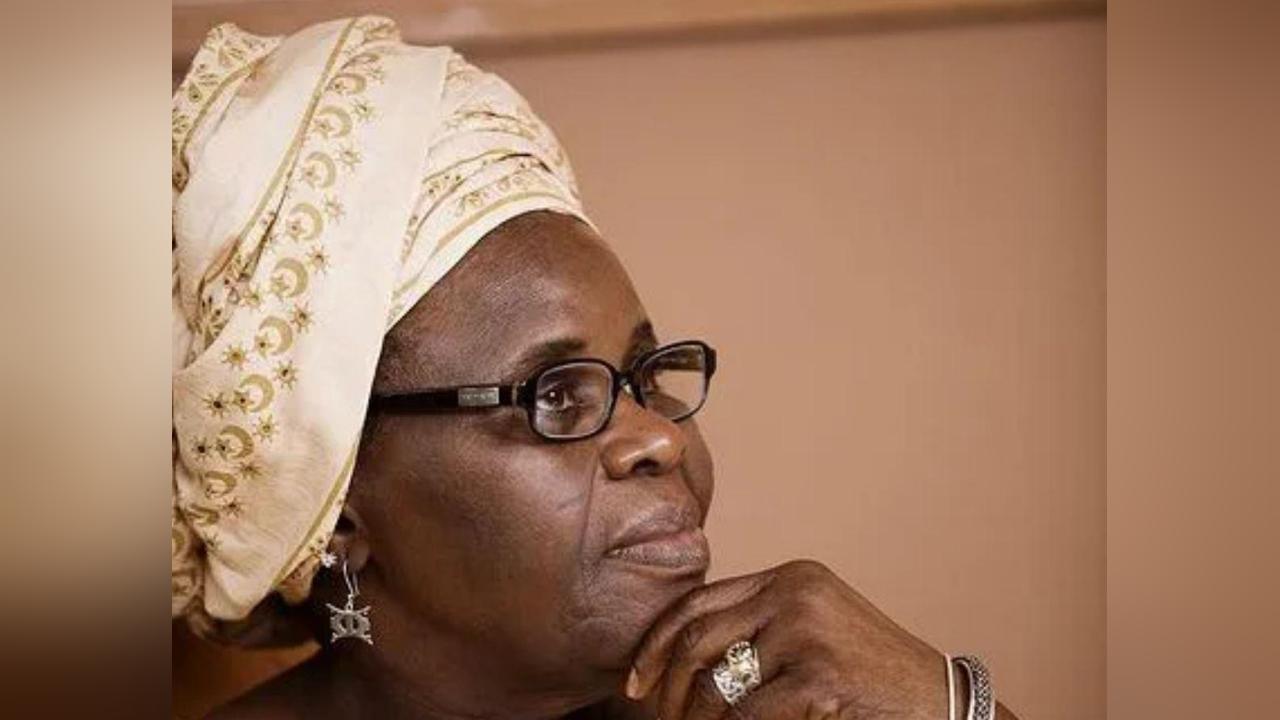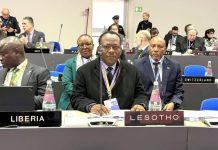Africa-Press – Lesotho. A week ago, early in the morning, a sad message floated across my Facebook page: “The family of Ama Ata Aidoo with deep sorrow has announced the death of Professor Aidoo.
” This message sent shivers in the writing fraternity from Cape to Cairo. The grandma of African literature had left us!
Aidoo is said to have died in the early hours of Wednesday, 31st May 2023 after an undisclosed illness at the age of 81. Some papers put her age at 82 some 83.
Ama Ata Aidoo is generally hailed as a trailblazer who opened doors for African women writers by challenging societal norms fearlessly. She also challenged us not to lose sight of the terrible effects of colonialism on the African continent.
We grew up gazing at pictures of her in her typical African head dress and colourful cloths and thick rimmed spectacles, which cut out the image of a daring African woman.
For most of us she was our earliest image of an African woman writer. For instance, I like the soft African grandmotherly touch of her poetry. In some of her key poems, she talks to an imagined African child about how the elders have betrayed the young ones.
Her words are simple and you may not need a dictionary, but the effect produces waves in one’s mind. Unlike many griots, Aidoo avoids blaming the youth but blames her generation for all the shame we have gotten into.
You see it, for example, in how she ends her poem called “Because you are here”: “Child, I hear you: and since wisdom does not always grow with our grey hairs,
may be, you can tell me what to do with my shame, and Our Continent once more betrayed?” The Dilemma of a Ghost is Aidoo’s short play published in 1965. In that story, Ato returns to Ghana from his studies in North America and he brings with him a sophisticated black American wife called Eulalie.
Their hopes of a happy marriage and of combining the “sweetness and loveliest things in Africa and America” are dashed because Ato is torn between his family’s traditional customs and his wife’s western ways.
Ato’s wife thinks that everything African is backward while her in-laws and the whole society think that she lacks substance and stability and is not fit to be their son’s wife.
They cannot even pronounce her name properly much as she mispronounces every word in her husband’s community. However, when the community learns that Eulalie is a descendant of slaves, they fall into a deep sadness.
The layers of irony in this story are unfathomable. Our Sister Killjoy: or Reflections from a Black-eyed Squint is the debut novel of Ama Ata Aidoo. It was first published by Longman in 1977.
It has been called “a witty, experimental work whose main point is a stylish dismissal of characteristic attitudes of both the white world and the black middle class.
Distantly meant to counter Conrad’s Heart of Darkness in which colonialist Europeans are shocked by the backwardness of Africans, this novel cleverly explores the thoughts and experiences of a Ghanaian girl on her travels in Europe.
Out of Africa with her degree and her all seeing eyes comes the girl, Sissie. She comes to Europe, to a land of towering mountains and low grey skies and tries to make sense of it all.
What is she doing here? Why aren’t the natives friendly? And what will she do when she goes back home? This novel has been hailed as a highly personal exploration of the conflicts between Africa and Europe, between men and women, and between a complacent acceptance of the status quo and a passionate desire to reform a rotten world.
The story focuses on how Aidoo’s country, Ghana, influences individuals to get an education and then get out of Africa and go to Europe or the States, the places that colonised and/or enslaved their people, and return more educated or, in some cases, to stay in these foreign countries and try to make money.
Sissie, an educated scholar herself, discovers that there is no shining answer to her nation’s problems since all parts of the world hold distinct prejudices and racism and hate.
In her collection of short stories called No Sweetness Here, Aidoo seems to be focused on portraying the material, economic and social challenges which plague post-colonial Ghana.
The implicit message is that Ghana is now free but the women are not! For the majority of these women independence has brought no relief and has in fact only increased the difficulties that they face.
In 1992 Ata Aidoo won the Commonwealth Writers’ Prize for the best African book for her novel Changes. It is a love story, about a career-oriented woman who divorces her first husband and navigates a new relationship. Ama Ata Aido gave many very exciting interviews throughout her career because she was unpredictable.
In an interview with Veena Sharma, this is what she says about the influence of orality on African writing: “I have found that all African writers, whether they are conscious of it or not, aspire to approximate the feel of oral story telling.
When I was growing up, even back then entertainment was by story-telling. And when we sat in the presence of a great story-teller, we were enraptured. It framed the way we look at stories. So, all African writers aspire to approximate that feel of oral story-telling on paper. ”
In 1990, Adeola James, a Nigerian born scholar of Literature, and then based at the University of Guyana, published a book carrying interviews with various women writers who had become prominent in African literature by that time.
Adeola held a no holds barred discussion with Ama Ata Aido and other key women writers of Africa like Zaynab Alkali, Buchi Emecheta, Pamela Kola, Ellen Kuzwayo, Muthoni Likimani, Molara Ogundipe-Leslie, Penina Muhando, Micere Mugo, Rebecca Njau, Flora Nwapa, Joyce Ochieng, Asenath Odaga, Ifeoma Okoye and Zulu Sofala.
Asked on the African writer’s dilemma of trying to reach a wide audience, versus the need to write in African languages, Ama Ata Aidoo says that she worries a lot about writing in English, a language “that is not accessible to our people.
Aidoo says that she is acutely aware that “writing in English makes it possible for me or any African writer to communicate with other people throughout the continent who share their colonial language.
. I have not pretended to myself that I have an answer.
I have also thought that, whilst one is aware of the language issue as big, it is better for a writer to write in English, than not to write at all. ”
Then on the question of whether the African woman writer is muted or not, Ama Ata Aidoo says that the question of the African woman writer being muted has to do with the position of women in society in general.
She feels that African women writers are just receiving the general neglect and disregard that woman in the larger society receives. Aidoo says she understands the concern that in African Literature maybe there is no woman writer who has risen to the stature of Achebe or Ngugi or Soyinka.
She indicates that this could be because the assessment of a writer’s work is in the hands of critics and it is they who put writers on pedestals or seep them under the carpet.
Then Adeola James puts to Aidoo: “Do you see any distinction in the way male and female African writers choose their themes and thrusts? Aidoo responds: “I think, as a woman writer, you approach issues from your position in life, in society, in history as a woman.
Now, as to whether the result of that position is saying things that are different from how a man would say or select them, that is a question that the critics ought to answer.
” Then Aidoo is drawn to the observation that her central characters in all her literature tend to be very strong women.
“Does she create them that way consciously because she is also a woman writer herself?” To that, she says, “I think that is natural. When a man wakes up in the morning, he sees a man when he looks in the mirror.
So if it is natural for male writers to create male central characters, then it should be natural for me, a woman writer, to create female central characters.
In that respect there has been a conscious decision. I am aware of the whole debate about wanting to write about women, but I would have written about women anyway.
And about the independent African women in her works, Aidoo has this to say: “You see, when I was attacked for creating so-called strong African women .
there in the West they would say, ‘African women, where do you get all these strong women?’ I say, ‘What do you mean?’ They say, ‘We don’t expect African women to be this strong.
’ I say, ‘Which African women have you met, how many and where? These are the kind of women I knew when I was growing up.
Aidoo continues, relentlessly: “So all these so- called independent women in my writing, I didn’t have to research or pretend, it is not a fabrication.
Do you see? My mother was a very quiet, soft-spoken person but still there she was . . . I never had the impression that she was kow-towing to anybody. Once in a while she gave in to my father who was the Chief, but then her father was a Chief too. I grew up among strong women. . . ”
When asked by BBC’s Hard Talk’s Zeinab Badawi in 2014 if she regarded herself as a writer with a mission, Aidoo replied: “In retrospect, I suppose I could describe myself as a writer with a mission. But I never was aware that I had a mission when I started to write. ”
In a 2011 essay, Nigeria’s awarding-winning Chimamanda Ngozi Adichie said about Aidoo, “When I first discovered Ama Ata Aidoo’s work – a slim book on a dusty shelf in our neighbour’s study in Nsukka [in south-eastern Nigeria] – I was stunned by the believability of her characters, the sureness of her touch and what I like to call, in a rather clunky phrase, the validating presence of complex femaleness.
Adichie proceeds: “Because I had not often seen this complex femaleness in other African books I had read and loved, mine was a wondrous discovery: of Anowa, tragic and humane and many dimensional, in Aidoo’s play set in the 1800s in Fantiland; of Sissie, the self-assured, perceptive main character of the ambitious novel Our Sister Killjoy, who wryly recounts her experiences in Germany and England in the 1960s; or of the varied female characters in No Sweetness Here, my favourite of Aidoo’s books.
” Aidoo was not only known for her literary prowess, though. In the early 1980s, she served as a Minister of Education.
Sadly, she resigned from the position when she could not fulfil her dreams of making education accessible and free to all Ghanaians. Professor Aidoo also received numerous literary accolades throughout her career.
Ama Ata Aidoo, author, poet, playwright and short story writer, was born in Ghana in 1942. She began her literary career by winning a prize in a short story competition organised by Ibadan’s Mbari Club, a famous cultural workshop of the early 1960’s in Nigeria.
Her published works include two plays, The Dilemma of a Ghost and Anowa; a collection of short stories, No Sweetness Here; a novel, Our Sister Killjoy and a collection of poetry, Someone Talking to Sometime. Ama Ata Aidoo is one of the best known African women writers, a recognition that she deserves.
https://www.thepost.co.ls/insight/tribute-to-ama-ata-aidoo/
For More News And Analysis About Lesotho Follow Africa-Press






